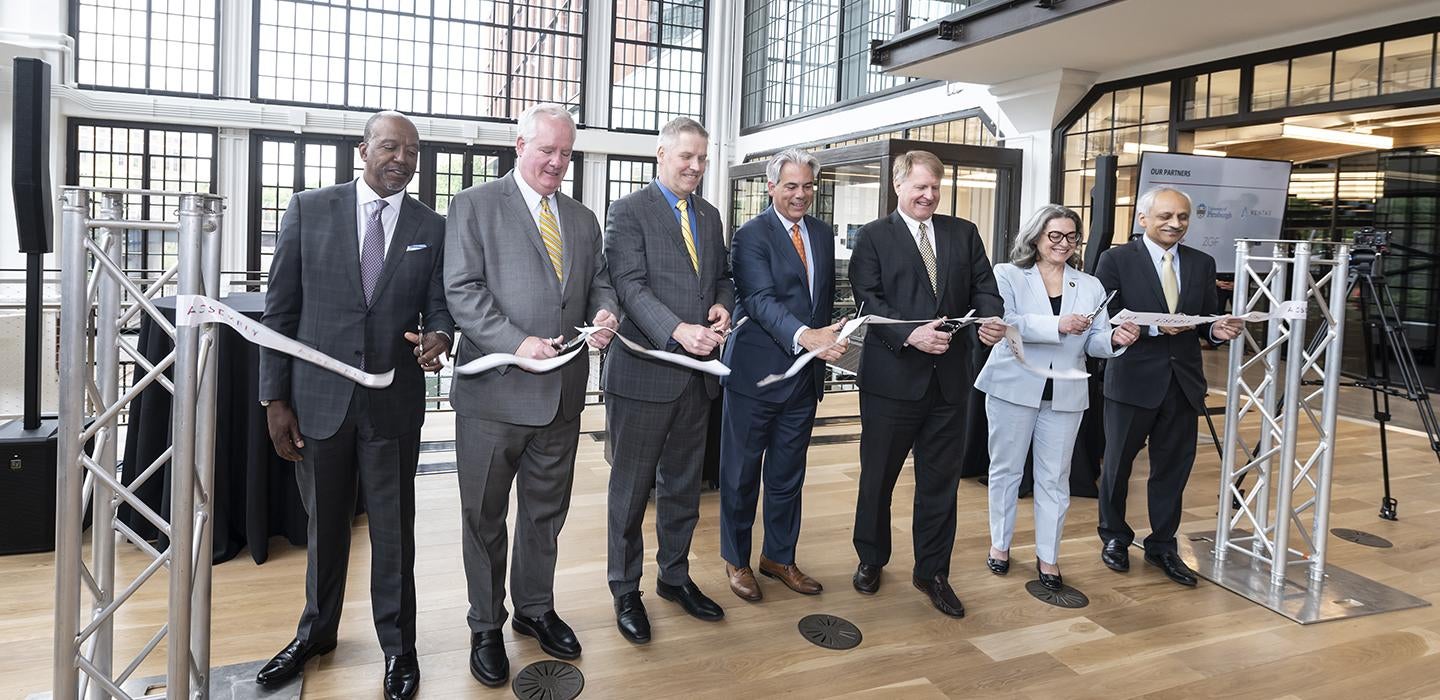
Subscribe to Pittwire Today
Get the most interesting and important stories from the University of Pittsburgh.More than a century ago, Henry Ford built a building in Pittsburgh to produce cars. Now, that same building might produce cures.
Welcome to The Assembly, a newly opened repository for biomedical research that will serve as an epicenter of innovation in life sciences for Pitt researchers, entrepreneurs and established companies.
“The Assembly is more than a facility. It is a confluence of Pittsburgh’s storied past, relentless evolution and astonishingly bright future. And I am excited to watch this space fill with world-renowned talent from the University of Pittsburgh who will make quick work of pushing medicine’s frontiers forward for society’s gain,” said University of Pittsburgh Chancellor Patrick Gallagher.
The University and Wexford Science & Technology, LLC, of Baltimore, a company that partners with universities and academic medical centers to develop “Knowledge Communities” centered on university research, held a ribbon-cutting ceremony and reception May 5 to mark the building’s official reopening.
A reminder of Pittsburgh’s legacy of manufacturing innovation, the building in the Bloomfield neighborhood was built in 1915 to produce and sell Model T automobiles.
But a $330 million refurbishment was able to maintain its structural integrity while updating the interior to house modern research and collaborative spaces.
“The partnership and shared vision of Wexford and the University of Pittsburgh has resulted in an iconic, collaborative environment that will create a new level of connected research and discovery that can move scientific breakthroughs from the laboratory to the marketplace,” said James Berens, founder and chairman of Wexford Science & Technology.
A home for scientific progress
The Assembly will be anchored by leading scientists in cancer research and immunology, including several Pitt investigators from the UPMC Hillman Cancer Center, Department of Immunology, and Institute for Precision Medicine.
“We are excited to see this new facility come to life as a space for bold, innovative biomedical research, education and training. It represents another milestone in the University of Pittsburgh and UPMC’s commitment to advance new treatments and cures while contributing significantly to the region’s expanding biotech sector,” said Anantha Shekhar, senior vice chancellor for the health sciences and John and Gertrude Petersen Dean of Pitt’s School of Medicine.
Katherine Aird, associate professor of pharmacology and chemical biology in the School of Medicine, praised The Assembly’s interactive research design as engendering collaboration among colleagues. Once moved to The Assembly, Aird's lab will be located near other Pitt cancer researchers.
“I look forward to having more spur-of-the-moment type of interactions with fellow scientists, which can sometimes be more informative than formal meetings,” Aird said, adding, “from a research perspective, having people nearby that are grappling with the same kind of questions my lab cohort and I are asking allows us to move our science forward even faster.”
Room for reflection and connection
The University will have use of a state-of-the-art 250+ seat auditorium on the facility’s ground floor, as well as an airy atrium, which will provide essential spaces for collegial discourse. Pitt is leasing approximately 245,000 square feet of The Assembly, leaving about 110,000 square feet available for lease by other tenants.
“Having space to host speakers, receptions and community conversations, room for larger gatherings is critical to cohering the community,” said Harinder Singh, director of the Center for Systems Immunology in the School of Medicine.
Aird said it also provides much needed space outside of the lab.
“The Assembly’s design includes a quiet space outside the lab environment, away from the hustle and bustle. In this new space, we have an area to sit down, think deeply and write,” she said.
Though the new building is sure to benefit Pitt’s already established research community, Singh also recognized its potential for attracting new talent to the University.
“To recruit the next generation of exceptionally talented scientists, you need a number of ingredients,” Singh said. “One is you need to show that you’ve got an exciting environment to start their careers — that environment is The Assembly.”
— Nichole Faina


